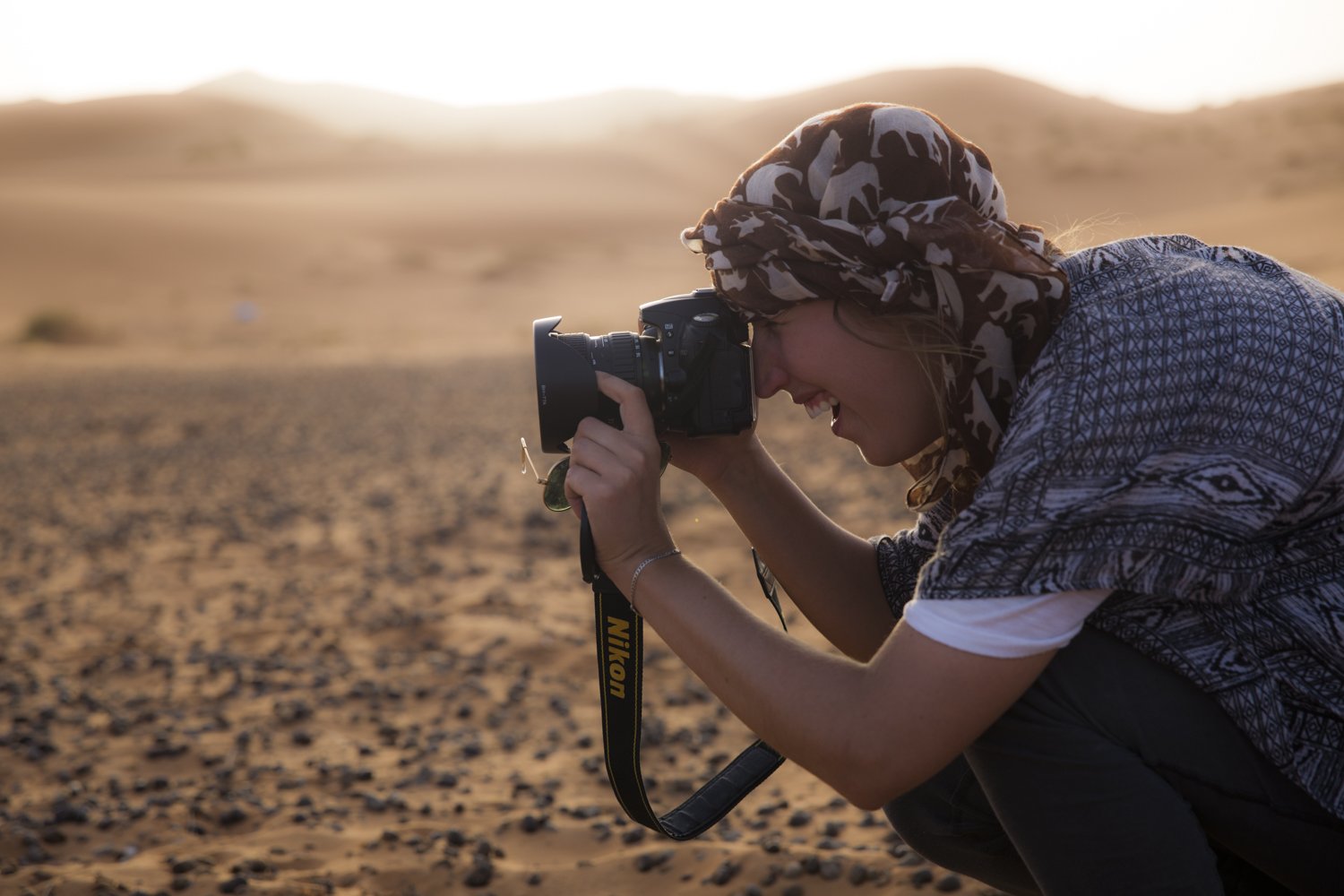Making a Travel Podcast During a Pandemic
Back in March 2020 when the first pandemic lockdown was announced, I was about one year into making my independent podcast, Curious Tourism (formerly known as Alpaca My Bags), with producer Kattie Laur. We had teamed up to create a travel show that would cover globetrotting with no holds barred.
The team behind travel podcast Curious Tourism, host Erin Elizabeth Hynes and producer Kattie Laur. (Photo Credit: Gabby Frank)
In our first year, we covered topics like balancing work with travel, solo travel, and homesickness. The show was gaining momentum fast, and we were excited about how enthusiastic our audience was about our content. One of our episodes had been featured in a podcast newsletter, our audience was growing, and our listeners were sharing encouraging feedback. But then the pandemic hit.
Pre-pandemic, I traveled internationally multiple times a year. I was known for quitting my job on a whim to take off for months at a time, often with my partner, who of course, I met while traveling. I had published a book about the history of leisure travel, built a travel blog, and started Curious Tourism.
Erin in Morocco
As I began canceling my trips to India, Sri Lanka and Iceland that had been planned for 2020, I started to wonder whether a travel podcast was relevant anymore. Our podcast listens had dipped, and Kattie and I were having active discussions about whether or not people wanted to hear about travel at a time when travel was impossible.
After talking in circles about putting the podcast on pause, or quitting it altogether, Kattie and I landed on a plan. We decided that since the reality of travel had changed, Curious Tourism should evolve, too.
Here are 4 steps we took to pivot the show and keep our content relevant in a world without travel.
1. We listened to our audience
Should we talk openly about the pandemic? Or did listeners want to escape reality and dream about traveling? We didn’t know, so our first step was to simply check in with our audience.
We had a decent following on Instagram, and so we polled our community about how they were feeling, what content they were craving, and whether or not they were still interested in a travel podcast.
We learned that our listeners wanted a mixture of content. They were interested in hearing about how the pandemic was impacting Kattie and I, and they were curious about our thoughts on the future of travel. But they also wanted to hear “pandemic-free” episodes, where the focus was on a travel theme that didn’t require us to delve into current events.
By the end of March, we had a clear picture of what our audience was looking for. We wanted to assure them all that we had heard their feedback, and that we would continue making the show. On March 29, we released a short update to our RSS feed letting our listeners know what to expect.
2. We evolved the show’s theme
When we started, the show was focused on covering travel experiences I’d had, and the experiences of my fellow traveling friends. Each episode had a theme, though they tended to be light and widespread, from talking about backpacking Cuba to sharing stories of homesickness. Pre-pandemic, we would occasionally touch on more complex subjects, like accessibility and travel, but it wasn’t the main focus of the show.
“As I began canceling my trips to India, Sri Lanka and Iceland that had been planned for 2020, I started to wonder whether a travel podcast was relevant anymore. ”
As the pandemic went on, I found myself thinking often about how important it was to re-think travel. While we’d never shied away from acknowledging and addressing the problematic aspects of travel, like its contributions to climate change, I felt that it was more fitting than ever to get people thinking about how they could travel better.
So we started covering more complex topics. I interviewed fellow travel blogger Lily Wunders about the experience of being asked, “No, where are you really from?” We talked with Martinique Lewis, a Black travel consultant, about how overwhelmingly white travel media is, and how we can change the existing white-centric narratives to be equitable and inclusive. We asked an expert, Melissa Chan (PhD) to explain cultural appropriation, how it comes up during travel, and how to appreciate versus appropriate.
By the summer of 2020, Curious Tourism became firmly centered around exploring responsible tourism. This thematic shift proved to be a good one. Overall episode listens were increasing, and we found that our listeners were super engaged with topics like travel privilege, voluntourism, and what travel is like through the lens of different identities. Our audience sent us messages saying they were learning from the episodes. Kattie and I were discovering a lot while making the episodes, so it was validating to know that our listeners were, too.
Erin in India
3. We experimented with new channels
With everyone at home and on their screens, we realized that we needed to present where our audience, and potential new listeners, were spending their time. We started experimenting with posting content promoting the show in new formats.
TikTok and Reels were gaining popularity, and so in early 2021 we started making video content that addressed topics relevant to the podcast. We came up with creative ways to relate TikTok trends to issues that are covered in various episodes of Curious Tourism.
@alpacamybagspod 10 yr old me talking to current me #travelpodcast #responsibletravel ♬ come into my arms - november
More recently, we experimented with creating swipe-through infographics for Instagram that summarize learnings from episodes. Using these new social media formats has broadened our reach, and encouraged discussion in our podcast community. We’ve noticed more direct messages in our inbox, and more comments on our content.
I also started researching podcast search engine optimization (SEO), and began optimizing our episodes. I used lockdown time to create a more detailed podcast website, with a page for every episode, to help build authority and increase our presence on organic search. And this effort produced results! Now, 37 of our episodes are being discovered through Google search.
4. We led with honesty and built community
We had always been pretty open with our listeners, but in the midst of the pandemic, we decided to be as honest as possible about how we were dealing. In our episodes, and on our social channels, we were transparent about when we were feeling low or burnt out.
I cried during an interview as I shared how devastated my mental health was without being able to do the thing I love; travel. We decided to keep my tears in the final cut. Pre-pandemic, I’m not sure I would have been willing to be that vulnerable as a host.
This honesty helped us to connect more personally with our listeners. Many of them reached out to share how they were feeling, and some even sent us postcards in the mail. Our honesty made Curious Tourism a more relatable listening experience, which helped build the trust and loyalty of our listeners.
To foster the community further, we created a private Facebook group for discussions about travel and responsible tourism. Listeners share interesting articles and ideas and discuss them. We also created a name for our listeners! On the show, we started referring to them as “Travel Pals.”
Over the last two years, Curious Tourism has evolved in more ways than one. We’ve evolved the podcast’s format and style, and we’ve evolved our community. The content of the show slowly changed from focusing on my personal travel stories, to covering topics relevant in a pandemic: how to travel more responsibly.
After we took steps to pivot the show in spring and summer 2020, our listens began to steadily climb again. Despite living in a time when travel isn’t so feasible, our travel podcast has been able to grow.
The growth in audience and listenership has been amazing to see, but it’s not the only measure of “success.” We’ve found that in the last year especially, the community that’s grown around the show has been the greatest reward.
My main takeaway? Adaptability is so important. Our willingness to make changes to our show and to experiment with new ideas kept the show fresh and relevant through uncertain times.









Producer Max Collins explains how to make a spaceship sound like a spaceship. Here’s a step-by-step guide on how to make a scripted fiction podcast.